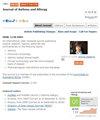Dupilumab Reduces Asthma Disease Burden and Recurrent SCS Use in Patients with CRSwNP and Coexisting Asthma
IF 3.7
3区 医学
Q2 ALLERGY
引用次数: 0
Abstract
Purpose: Dupilumab significantly reduced the requirement for systemic corticosteroids (SCS) in patients with severe chronic rhinosinusitis with nasal polyps (CRSwNP). Patients with CRSwNP and coexisting asthma typically have a higher disease burden and have more difficulty in managing disease. Here, we report an analysis of asthma outcomes and SCS use in patients with CRSwNP and coexisting asthma.Patients and Methods: This was a post hoc analysis of the randomized, placebo-controlled SINUS-24 and SINUS-52 studies (NCT02912468/NCT02898454) in patients with severe CRSwNP and coexisting asthma (patient self-reported) from the pooled intention-to-treat population randomized to dupilumab 300 mg every 2 weeks or placebo. On-treatment SCS use was estimated using Kaplan–Meier analysis. Forced expiratory volume in 1 s (FEV1), percent predicted FEV1, and the 6-item Asthma Control Questionnaire (ACQ-6) were assessed at baseline and Week 24 (pooled SINUS-24/52) in patients with/without history of asthma exacerbation or prior SCS use.
Results: Of 337 patients with coexisting asthma, 88 (26%) required on-treatment SCS use. The requirement for on-treatment SCS use for any reason was significantly lower with dupilumab (20/167 patients; 12%) vs placebo (68/170; 40%); hazard ratio (95% confidence interval) 0.248 (0.150– 0.409); p < 0.0001. The most frequent reasons for SCS use were nasal polyps (dupilumab 3% and placebo 27%) and asthma (2% and 9%, respectively). FEV1, percent predicted FEV1, and ACQ-6 were all significantly improved at Week 24 with dupilumab vs placebo irrespective of history of asthma exacerbation or prior SCS use (all p < 0.01).
Conclusion: Dupilumab significantly reduced the requirement for SCS and improved asthma outcomes irrespective of history of asthma exacerbation or prior SCS use vs placebo in patients with CRSwNP and coexisting asthma, demonstrating concomitant reduction of SCS use and asthma disease burden in these patients.
Plain Language Summary: Chronic rhinosinusitis with nasal polyps (CRSwNP) and asthma are type 2 inflammatory conditions that often coexist. Patients with both CRSwNP and asthma generally have worse symptoms that are more difficult to treat. Their standard treatment is topical (inhaled/intranasal) corticosteroids, but where this is ineffective, systemic corticosteroids, also called SCS, are used. SCS are effective at reducing nasal polyp size and improving symptoms, but this effect often does not last, and many patients experience side effects when SCS are used for a long time. Dupilumab, a drug that targets type 2 inflammation, is approved for treating both uncontrolled CRSwNP and moderate-to-severe asthma. Here, we investigate whether dupilumab changes how often patients with CRSwNP and asthma need to use SCS and its effect on their asthma. We found that dupilumab-treated patients were 75% less likely to need SCS than patients treated with placebo and also had significantly greater improvements in measures of their asthma severity, irrespective of their history of previous asthma attacks or previous SCS use. These results show that, in patients with CRSwNP and asthma, dupilumab can improve asthma symptoms and reduce the need for SCS use. Using fewer SCS may help patients avoid the side effects associated with SCS use.
Keywords: asthma control, asthma exacerbation, chronic rhinosinusitis with nasal polyps, systemic corticosteroids, LIBERTY SINUS-24, LIBERTY SINUS-52
杜匹单抗能减轻 CRSwNP 并发哮喘患者的哮喘疾病负担和 SCS 复发率
目的:杜匹单抗能显著减少严重慢性鼻炎伴鼻息肉(CRSwNP)患者对全身皮质类固醇(SCS)的需求。CRSwNP 并发哮喘的患者通常疾病负担较重,在控制疾病方面也更加困难。在此,我们报告了对 CRSwNP 并发哮喘患者的哮喘预后和 SCS 使用情况的分析:这是对随机、安慰剂对照的 SINUS-24 和 SINUS-52 研究(NCT02912468/NCT02898454)进行的一项事后分析,研究对象是重度 CRSwNP 患者和合并哮喘患者(患者自我报告),这些患者来自随机接受每 2 周服用 300 毫克 dupilumab 或安慰剂的汇总意向治疗人群。采用卡普兰-梅耶尔分析法估算治疗期间 SCS 的使用情况。在基线和第24周(SINUS-24/52汇总)对有/无哮喘加重史或既往使用过SCS的患者进行了1 s内用力呼气容积(FEV1)、FEV1预测百分比和6项哮喘控制问卷(ACQ-6)评估:在 337 名合并哮喘的患者中,有 88 人(26%)需要在治疗过程中使用 SCS。因任何原因需要在治疗过程中使用 SCS 的比例,dupilumab(20/167 例患者;12%)明显低于安慰剂(68/170 例患者;40%);危险比(95% 置信区间)为 0.248 (0.150-0.409);p < 0.0001。使用 SCS 的最常见原因是鼻息肉(dupilumab 为 3%,安慰剂为 27%)和哮喘(分别为 2% 和 9%)。与安慰剂相比,无论是否有哮喘加重史或之前是否使用过SCS,在第24周时,使用杜匹单抗与安慰剂相比,FEV1、预测FEV1百分比和ACQ-6均有显著改善(均为p < 0.01):杜匹鲁单抗与安慰剂相比,能明显降低CRSwNP合并哮喘患者对SCS的需求,并改善哮喘预后,而与哮喘加重史或既往使用SCS无关,这表明这些患者同时减少了SCS的使用和哮喘疾病负担。同时患有慢性鼻炎伴鼻息肉和哮喘的患者一般症状较重,治疗起来较为困难。其标准治疗方法是局部(吸入/鼻内)使用皮质类固醇,但如果效果不佳,则使用全身性皮质类固醇,也称为 SCS。全身皮质类固醇能有效缩小鼻息肉并改善症状,但这种效果往往不持久,而且许多患者在长期使用全身皮质类固醇时会出现副作用。杜比鲁单抗是一种针对 2 型炎症的药物,已被批准用于治疗不受控制的 CRSwNP 和中重度哮喘。在此,我们研究了杜匹单抗是否会改变 CRSwNP 和哮喘患者需要使用 SCS 的频率及其对哮喘的影响。我们发现,与接受安慰剂治疗的患者相比,接受杜利单抗治疗的患者需要使用 SCS 的几率降低了 75%,而且无论患者既往是否有哮喘发作史或既往是否使用过 SCS,他们的哮喘严重程度都得到了显著改善。这些结果表明,对于 CRSwNP 和哮喘患者,dupilumab 可以改善哮喘症状,减少 SCS 的使用。减少使用 SCS 可帮助患者避免与使用 SCS 相关的副作用。关键词:哮喘控制、哮喘加重、伴有鼻息肉的慢性鼻窦炎、全身皮质类固醇、LIBERTY SINUS-24、LIBERTY SINUS-52
本文章由计算机程序翻译,如有差异,请以英文原文为准。
求助全文
约1分钟内获得全文
求助全文
来源期刊

Journal of Asthma and Allergy
Medicine-Immunology and Allergy
CiteScore
5.30
自引率
6.20%
发文量
185
审稿时长
16 weeks
期刊介绍:
An international, peer-reviewed journal publishing original research, reports, editorials and commentaries on the following topics: Asthma; Pulmonary physiology; Asthma related clinical health; Clinical immunology and the immunological basis of disease; Pharmacological interventions and new therapies.
Although the main focus of the journal will be to publish research and clinical results in humans, preclinical, animal and in vitro studies will be published where they shed light on disease processes and potential new therapies.
 求助内容:
求助内容: 应助结果提醒方式:
应助结果提醒方式:


